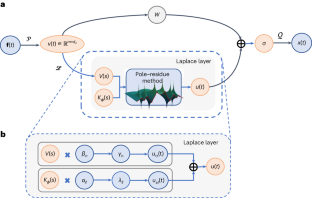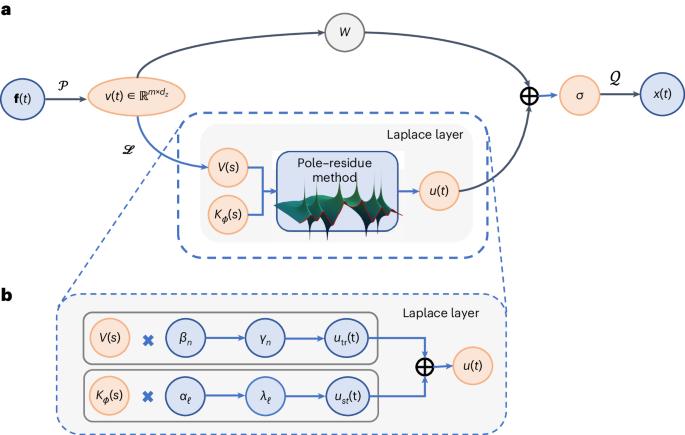用于求解微分方程的拉普拉斯神经算子
IF 18.8
1区 计算机科学
Q1 COMPUTER SCIENCE, ARTIFICIAL INTELLIGENCE
引用次数: 0
摘要
与标准神经网络不同,神经算子可将多个函数映射为不同的函数,可能是不同空间的函数。因此,神经算子可以求解参数常微分方程(ODE)和偏微分方程(PDE)的边界或初始条件和激励分布,也可用于系统识别以及设计数字双胞胎的各种组件。我们引入了拉普拉斯神经算子(LNO),它结合了输入-输出空间之间的极点-残差关系,从而使某些类别的问题具有更好的可解释性和通用性。拉普拉斯神经算子能够处理非周期性信号以及由零和非零初始条件同时产生的瞬态响应,这使得它在求解若干 ODE 和 PDE 时,在外推法情况下比其他神经算子获得更好的近似精度。我们还强调了 LNO 在域内任意位置从低分辨率输入到高分辨率输出的良好插值能力。为了证明 LNO 的可扩展性,我们采用数百万自由度对全球各地的罗斯比波进行了大规模模拟。总之,我们的研究结果表明,经过预训练的 LNO 模型可为大规模的一般 ODE 和 PDE 提供有效的实时解决方案,是现有神经算子的有效替代品。本文章由计算机程序翻译,如有差异,请以英文原文为准。


Laplace neural operator for solving differential equations
Neural operators map multiple functions to different functions, possibly in different spaces, unlike standard neural networks. Hence, neural operators allow the solution of parametric ordinary differential equations (ODEs) and partial differential equations (PDEs) for a distribution of boundary or initial conditions and excitations, but can also be used for system identification as well as designing various components of digital twins. We introduce the Laplace neural operator (LNO), which incorporates the pole–residue relationship between input–output spaces, leading to better interpretability and generalization for certain classes of problems. The LNO is capable of processing non-periodic signals and transient responses resulting from simultaneously zero and non-zero initial conditions, which makes it achieve better approximation accuracy over other neural operators for extrapolation circumstances in solving several ODEs and PDEs. We also highlight the LNO’s good interpolation ability, from a low-resolution input to high-resolution outputs at arbitrary locations within the domain. To demonstrate the scalability of LNO, we conduct large-scale simulations of Rossby waves around the globe, employing millions of degrees of freedom. Taken together, our findings show that a pretrained LNO model offers an effective real-time solution for general ODEs and PDEs at scale and is an efficient alternative to existing neural operators. Neural operators are powerful neural networks that approximate nonlinear dynamical systems and their responses. Cao and colleagues introduce the Laplace neural operator, a scalable approach that can effectively deal with non-periodic signals and transient responses and can outperform existing neural operators on certain classes of ODE and PDE problems.
求助全文
通过发布文献求助,成功后即可免费获取论文全文。
去求助
来源期刊

Nature Machine Intelligence
Multiple-
CiteScore
36.90
自引率
2.10%
发文量
127
期刊介绍:
Nature Machine Intelligence is a distinguished publication that presents original research and reviews on various topics in machine learning, robotics, and AI. Our focus extends beyond these fields, exploring their profound impact on other scientific disciplines, as well as societal and industrial aspects. We recognize limitless possibilities wherein machine intelligence can augment human capabilities and knowledge in domains like scientific exploration, healthcare, medical diagnostics, and the creation of safe and sustainable cities, transportation, and agriculture. Simultaneously, we acknowledge the emergence of ethical, social, and legal concerns due to the rapid pace of advancements.
To foster interdisciplinary discussions on these far-reaching implications, Nature Machine Intelligence serves as a platform for dialogue facilitated through Comments, News Features, News & Views articles, and Correspondence. Our goal is to encourage a comprehensive examination of these subjects.
Similar to all Nature-branded journals, Nature Machine Intelligence operates under the guidance of a team of skilled editors. We adhere to a fair and rigorous peer-review process, ensuring high standards of copy-editing and production, swift publication, and editorial independence.
 求助内容:
求助内容: 应助结果提醒方式:
应助结果提醒方式:


